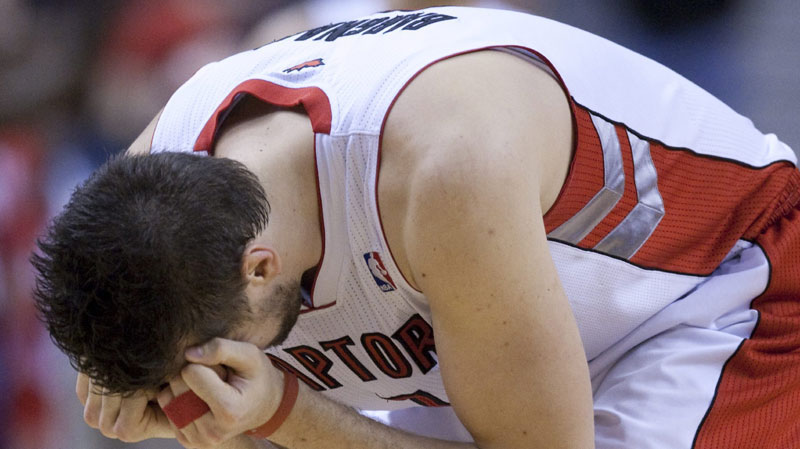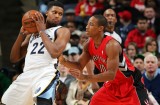This summer, ESPN.com championed a great format, the 5-on-5: five questions asked of five ESPN bloggers (The Raptor one here). Since Arsenalist is wigging out from writing article after article without anything new to talk about, we thought we would adopt the 3-on-3 format created for the TrueHoop Network sites. Three of us (as well as bloggers from other sites, folks from Twitter and even RR commenters) will answer three burning questions. If you want to participate in future ones, drop me an email.
Is it fair to say the Players Union failed? What could they have done better throughout this process?
Tom Liston: Yes. Ultimately they should have been able to settle for a slightly better deal. Obviously, the owners have much more leverage. However, the decertification threat was poorly timed – the players union needed to play that card in the summer, not now. They may have gained a small bit of leverage of their own. However, by doing it now, it largely has turned the fans against their side. My view is they should have put the deal back to David Stern, with a couple tweaks they wanted. Even still if it was a tough deal for them to accept, push it back in his court and let him address the media and fans on why he wouldn’t make a few small changes. The deal on the table was at – or very close to – the best deal they will get.
Blake Murphy: Yes. Billy Hunter repeatedly said that he saw this playing out two or three years ago, so the inaction from then until just a few months ago is inexcusable. While the players had little to no leverage in negotiations, the timing of some of their tactics (like the decertification process) was questionable at best. I also found the lack of involvement from the rank-and-file as a whole to be disappointing, and I wouldn’t be surprised to learn that players have lost faith in the process. The owners are to blame as well, of course, but both sides failed if there is no season.
Arsenalist: I’m writing this after Tom and Blake, and they pretty much covered every point. The only way this can turn out good for the players is if the NBA is found guilty in the courts, and are ordered to pay “treble damages”, which would mean the NBA shelling out a lot more than what they’re owed on the contracts. You would think that whatever deal the players end up getting, it’ll be better than what was offered by the league last week, and although the current player only stand to lose, perhaps the future one might benefit. In that instance, you could argue that although the Players Union failed the current crop of players, it might serve to benefit ones to come.
A part of the decertification process will be disputes over the validity of current contracts; with the owners wanting them all declared null and void. If all contracts are null and void, what would that mean for the Raptors?
Tom: Too difficult to say. If it ended up a completely free market situation (highly unlikely) II believe Toronto is an above average market, but certainly players would gravitate to Boston, LA, Chicago, Miami etc. We have a couple tough contracts, but not bad vis-a-vis other teams. We also have a few nice players on (or entering) rookie scale deals, which would be the negative.
Blake: I don’t think it would have much of an impact at all. The large question would be whether teams still own exclusive rights to players on their rookie contracts, so the Raptors would still have control of players like DeRozan, Davis, and even Jonas. I can’t see the Raptors being able to attract any stars in a “fantasy draft” style free agent frenzy, but their would be advantages to be gained in terms of organizational flexibility (e.g. their international flavor, or by allowing players to sign “together”). There are no albatross contracts the Raptors would be excited to get out from under (I’m not even sure who they’d use the proposed amnesty clause on), and the risk of not attracting any tier-one or tier-two players would scare me a bit.
Arse: The Raptors might welcome a ‘reset’ button for guys like Jose Calderon and Andrea Bargnani, but on the flip side DeMar DeRozan probably stands to make more than he’s making as part of the current CBA. The larger question, as Blake mentioned, is what kind of rights the Raptors would hold on their players. Pound-for-pound, I don’t see the Raptors out-attracting many teams for unrestricted free-agents, so I’m inclined to believe the voiding of contracts would have an overall negative effect.
Will there be a season, and if there is, will you care as much?
Tom: Yes. The global economy is on the edge. I’d really like to see all those employees the teams have back to work. The spin-offs are also important (although fans would spend discretionary income elsewhere). If there is a season, the majority of fans will come back quickly. There were several great matchups in last year’s post season and it will carry over to this year.
Blake: There will not be a season. As I understand it, this process is basically a legal one now, and unless the courts are ready to rule with summary judgment, the process could really drag out. If mid-January is essentially doomsday, that would mean the union and league have two months to reconcile their differences and get back to good-faith negotiating, which at this point seems unrealistic. If they come back, of course I’ll care every bit as much, especially as a season ticket holder. I’m sure it’s the same feeling for the rest of the “die-hards,” but I can’t see the casual fans coming back as quickly.
Arse: The lawyer-talk of the last few days makes me quite skeptical about the prospect of a season, unless all this is another negotiating tactic, and there’s a loophole somewhere which allows Stern and the players to negotiate and strike a deal under soem sort of CBA. I wasn’t too hot on this season to begin with as there was very little to look forward to, especially with Jonas being overseas. I’ve long been a proponent of a shorter season, so I’d actually enjoy a 60-game season a lot more. If it ever happens, that is.




